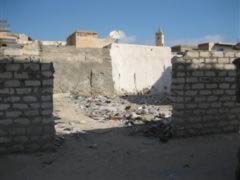Libya was a bit of a strange country to travel in. Few tourists go there, and those that do are mainly Italian, driving brand new 4WDs, of the sort normally only used to ferry Tarquin 300m down the road to school. They are kitted out with all the fancy gear – where as our group in the desert had 20 year old landcruisers, and I don’t believe we had so much as a shovel.
Two things you notice on first arriving – one is the piles of rubbish everywhere, and second is the Gaddafi propaganda billboards, etc. Let’s get those photos out of the way first:
Tripoli was a bit of a funny city – there were still traces of the Italians, but much of it is being allowed to decay. So some parts could look OK:
But then you walk just around the corner, and see scenes like this:
There are two major Roman sites, Sabratha and Leptis Magna. It is a shame that there is not much archaeological work going on right now. Much of it was done by the Italians in the 1920s. Sabratha is a pretty big site. Note the toilet design in the second picture – it would have been quite the communal affair
Although most of the roads are endlessly long, straight and boring, you do need to keep an eye out for the odd traffic hazard:
Accommodation was sometimes a little basic – here we slept in, quite literally, mudhuts. Actually they weren’t too bad, but not so good in a dust storm – or the rain, not that that matters.
There were some incredible landscapes in the desert. Just big, vast distances, and a feeling of emptiness. This is a collection of shots, including some of, or from, our campsites:
Somewhat disturbingly, we broke down quite a few times. Luckily we only got stuck a couple of times
At one time, the Garamantians controlled an enormous swathe of territory, racing around in their chariots. And what’s left? A few crumbly mud ruins. Ozymandias indeed.
The desert climate has preserved a large number of paintings and carvings in the rock faces, dating back several thousand years. If you look closely at the second one, you will see what men were carving before the birth of Christ. Porn.
We sure did dine in some fine places in Libya. Several dusty, rubbish-filled parking lots, and then a beautiful corridor:
Ghadames, while being a long way from anywhere, is a remarkable city. I haven’t been able to capture it properly here, but it was a city built to deal with the culture, which separated the sexes. The men lived on the ground, the women moved across the rooftops between the houses. I still think it would have been easier to have let the sexes mix though.
Staying in a Troglodyte lodge was pretty cool. This one was several caves built into a hill – not the crater style seen in Star Wars. For once, spectacularly good food here too.
We visited a deserted Berber village, built on a clifftop. I was wondering if it was deserted because they all fell off. Possibly.
This fortified granary was pretty neat. Lots of chambers, for the local families to store their grain. They let you climb all over it, get right inside the chambers. You’d never be able to do that at a historical site here.
The Tripoli Museum had some quite outstanding pieces, which would get a lot more recognition if the country was more accessible. These were a couple of random ones that took my fancy
Leptis Magna is probably the best Roman site on the Mediterranean. A huge, only barely uncovered site. I especially liked the amphitheatre. A little bit of work and they could hold great concerts here.















































